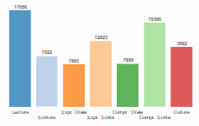| Grammar |
MOU AND MADA (もう / まだ)
MOU (もう) and MADA (まだ) share the particularity of having a different meaning depending on whether the sentence is affirmative or negative.
MOU (もう)
First of all, もう means “already” in an affirmative sentence. The action is finished or the state was achieved as we speak.
| Mou neru jikan da yo. |
| It’s already time to go to bed. |
With もう, the verb is often conjugated in the past tense, since the action is already over as we speak. Be careful not to confuse もう and the structure “Verb (form -TA) + KOTO + GA + ARU,” which expresses experience (have already done/lived through something). Here’s an explicit example of this difference:
| Mou tabeta? |
| Have you already eaten? |
Here, we’re talking about a completed action, not an experience. Asking if someone has already had the experience of eating doesn’t make sense. Of course, asking someone if they have already had the experience of eating sushi, for example, is possible.
| Sushi o tabeta koto ga arimasu ka. |
| Have you ever/already eaten sushi before? |
In a negative sentence, もう means “no longer” or “not anymore.” The action is also over and no longer exists.
| Boku wa mou nihon ni inai. |
| I am no longer in Japan. |
Be careful, however: when もう is used with counters or words of quantity, it means “again,” etc.
| Mou ichido! |
| One more time!/Again!/Once more! |
| Mou sukoshi tabetai. |
| I want to eat a little more. |
MADA (まだ)
Then there is まだ, which means “still” in an affirmative sentence. The action or state continues, even now; it’s projected toward the future.
| Boku wa mada jikan ga aru yo. |
| I still have some time. |
Literally: In my case, still some time exists.
However, まだ means “not yet” when the sentence is negative. This time, the action or state doesn’t exist in the present, but should occur in the near future.
| Mada tabete inai kara, resutoran ni ikou! |
| Seeing that I haven’t eaten yet, let’s go to a restaurant! |




















FrozZenSenpai
So 食べていない simply means "not eating (at the moment)".
Element
Clinch